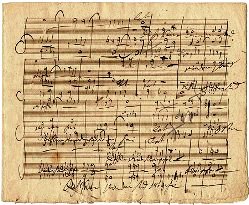
As geologist and science writer Nina Morgan discovers, it really does take one to know one.
Image:
Beethoven. Evidently lots of very clever people can't write neatly...
Geoscientist 21.07 August 2011
Long before computers, email or even typewriters – the major means of communication among the pioneers of geology was the handwritten letter. With several deliveries a day, and a postal service that seemed to have little trouble deciphering even the vaguest of addresses and could apparently deliver letters with lightning speed, it was a system that seemed to work very well.
And as a bonus, there now remains a rich archive of letters that reveal in great detail the progress and thoughts behind the major discoveries in geology. But anyone who has spent time looking through these cannot fail to be struck by how little care correspondents apparently took to ensure that their brilliant insights could be easily – let alone accurately – read by the recipients. Just occasionally, however, the baffled recipients fought back.
In a letter preserved in the Devon record office, and dated simply 'Friday', Richard Whately (1787-1863) who was then probably a fellow of Oriel College, Oxford, and later went on to become Church of Ireland Archbishop of Dublin, wrote to William Buckland the first reader in geology at Oxford University, to protest:
Dear Buckland
On our return last night I found as I thought that a spider had crawled out of the inkstand over a bit of paper; but it turns out to be a hieroglyphic from you wh I so far interpreted as to perceive it was an invitation to meet some Professor; whose name as you wrote it looked somewhat indecent. I shall be happy to wait on you & take the opportunity of learning the [illegible word!] mode of writing.
Yrs truly,
R Whately
A notorious eccentric with a penchant for keeping herrings in his college rooms to grill on his fire for breakfast, Whately must have been a perfect match for the equally idiosyncratic Buckland. Clearly, it takes one to know one.
Acknowledgment
This vignette is based on a handwritten letter from Richard Whately to William Buckland preserved at the Devon Record Office. Other sources include the entry for Richard Whately by Richard Brent in the Oxford Dictionary of National Biography.
- If the past is the key to your present interests, why not join the History of Geology Group (HOGG)? For more information and to read the latest HOGG newsletter, visit: www.geolsoc.org.uk/hogg, where the programme and abstracts from the Conference on Geological Collectors and Collecting are available as a pdf file free to download.
* Nina Morgan is a geologist and science writer based near Oxford.